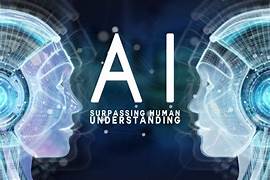Artificial intelligence (AI) is a branch of computer science that deals with the creation of intelligent agents, which are systems that can reason, learn, and act autonomously. AI research has been highly successful in developing effective techniques for solving a wide range of problems, from game playing to medical diagnosis.
One of the most important recent advances in AI has been the development of deep learning, a type of machine learning that uses artificial neural networks to learn from data. Deep learning has been used to achieve state-of-the-art results in a wide range of tasks, including image recognition, natural language processing, and speech recognition.
AI is still a young field, and there is much that we do not know about how to build truly intelligent systems. However, the progress that has been made in recent years is remarkable, and it is clear that AI has the potential to revolutionize many aspects of our lives.
Here are some of the ways that AI is already being used today:
- Game playing: AI has been used to develop computer systems that can play games at a superhuman level. For example, the AI system AlphaGo defeated the world champion Go player in 2016.
- Medical diagnosis: AI is being used to develop systems that can help doctors diagnose diseases. For example, the AI system Watson has been used to help doctors diagnose cancer.
- Self-driving cars: AI is being used to develop self-driving cars. These cars use sensors and AI algorithms to navigate the road without human input.
- Customer service: AI is being used to develop chatbots that can answer customer questions and resolve issues.
- Product recommendations: AI is being used to develop systems that can recommend products to customers based on their past purchases and browsing behavior.
These are just a few examples of the ways that AI is being used today. As AI technology continues to develop, we can expect to see even more innovative and groundbreaking applications in the years to come.
Here are some of the potential benefits of AI:
- Improved efficiency: AI can help to improve efficiency in a wide range of industries, from manufacturing to healthcare.
- Increased productivity: AI can help to increase productivity by automating tasks that are currently done by humans.
- Improved decision-making: AI can help to improve decision-making by providing insights and recommendations that would not be possible to obtain without AI.
- Personalized experiences: AI can be used to create personalized experiences for customers and users. For example, AI-powered recommendation systems can suggest products that are likely to be of interest to a particular user.
- New innovations: AI can be used to develop new products and services that would not be possible without AI. For example, AI-powered self-driving cars are a new innovation that is only possible thanks to AI.
Of course, there are also some potential risks associated with AI. These risks include:
- Job displacement: AI could lead to job displacement in some industries, as machines become capable of doing tasks that are currently done by humans.
- Privacy concerns: AI systems could collect and use personal data in ways that raise privacy concerns.
- Bias: AI systems could be biased, reflecting the biases of the data that they are trained on.
- Weaponization: AI could be used to develop autonomous weapons that could pose a threat to humanity.
It is important to be aware of both the potential benefits and risks of AI. As AI technology continues to develop, it is important to ensure that AI is used in a responsible and ethical way.
Here are some of the things that can be done to ensure that AI is used in a responsible and ethical way:
- Transparency: AI systems should be transparent so that users can understand how they work and how their data is being used.
- Accountability: AI systems should be accountable so that users can hold them responsible for any harm that they cause.
- Fairness: AI systems should be fair so that they do not discriminate against any particular group of people.
- Security: AI systems should be secure so that they cannot be hacked or used for malicious purposes.
By taking these steps, we can help to ensure that AI is used for good and not for harm.






